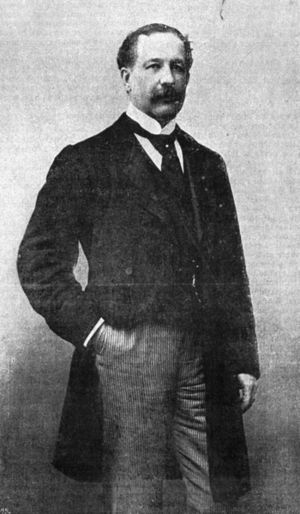William O'Shea facts for kids
Quick facts for kids
William O'Shea
|
|
|---|---|

O'Shea c. 1880
|
|
| Member of Parliament for Galway Borough | |
| In office 1886–1886 |
|
| Preceded by | T. P. O'Connor |
| Succeeded by | John Pinkerton |
| Member of Parliament for Clare | |
| In office 1880–1885 Serving with James Patrick Mahon
|
|
| Preceded by | James Patrick Mahon Lord Francis Conyngham |
| Succeeded by | Constituency abolished |
| Personal details | |
| Born | 1840 Dublin, Ireland, UK |
| Died | 22 April 1905 (aged 65) |
| Political party | Independent Nationalist |
| Spouse |
Katharine O'Shea
(m. 1867; div. 1890) |
| Military service | |
| Allegiance | |
| Branch/service | British Army |
| Rank | Captain |
| Unit | 18th Royal Hussars |
Captain William Henry O'Shea (1840 – 22 April 1905) was an Irish soldier and a Member of Parliament. He is known for his role in Irish politics during the late 1800s.
Contents
William O'Shea's Early Life
William O'Shea was born in Dublin, Ireland, in 1840. He chose a career in the military. He became a captain in the 18th Hussars. This was a cavalry unit of the British Army.
His Family Life
In 1867, William O'Shea married Katharine O'Shea. She was from Essex, England. Their marriage later ended in divorce in 1890.
William O'Shea's Political Career
William O'Shea was involved in politics in Ireland. He served as a Member of Parliament (MP) for two different areas.
Representing Clare
From 1880 to 1885, O'Shea was the MP for Clare. This was an important time in Irish history. He worked to represent the people of his area in the British Parliament.
Representing Galway Borough
In 1886, O'Shea also served a short time as the MP for Galway Borough. Even though he was supported by the Irish nationalist leader Charles Stewart Parnell, O'Shea was an Independent Nationalist. This means he did not belong to Parnell's political group, the Irish Parliamentary Party.
His Role in Key Negotiations
In 1882, the British government was talking secretly with Charles Stewart Parnell. Parnell was a very important Irish leader. He was being held in Kilmainham Gaol at the time. The government wanted to discuss his release.
Joseph Chamberlain, a government official, chose William O'Shea to help with these talks. O'Shea spent several hours negotiating with Parnell in prison. He helped to get an agreement that Parnell would support the government after his release. This agreement was important for the politics of the time.
Resignation from Parliament
In 1886, there were some public discussions about O'Shea's personal life. These discussions appeared in a newspaper called the Pall Mall Gazette. Because of this, O'Shea decided not to vote on a major law called the First Irish Home Rule bill. The very next day, he resigned from his seat in Parliament.
Later Life
William O'Shea filed for divorce in December 1889. This happened after his wife's aunt passed away. The aunt had left her money to Katharine O'Shea. This inheritance was part of the reason for the divorce proceedings. However, the aunt's will was later changed. The money was then shared among Katharine O'Shea's siblings.
William O'Shea passed away on April 22, 1905, at the age of 65.
 | Kyle Baker |
 | Joseph Yoakum |
 | Laura Wheeler Waring |
 | Henry Ossawa Tanner |

